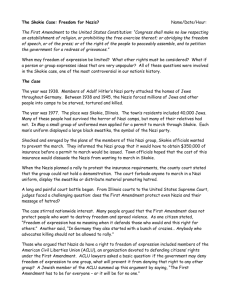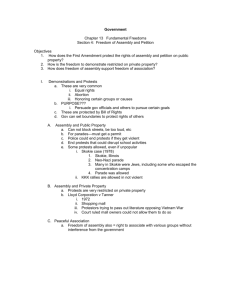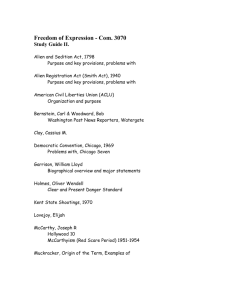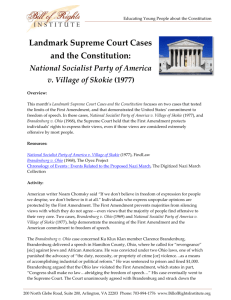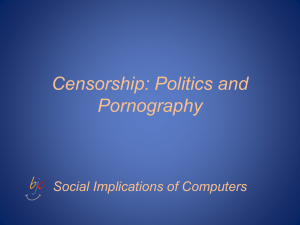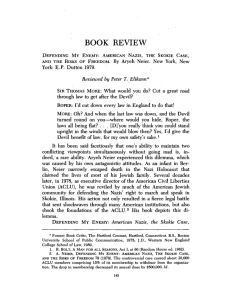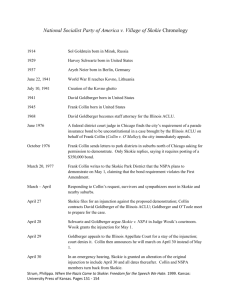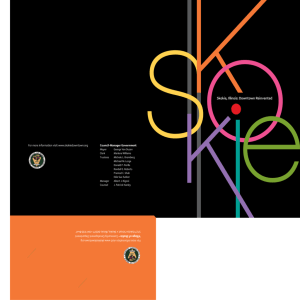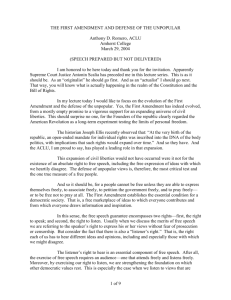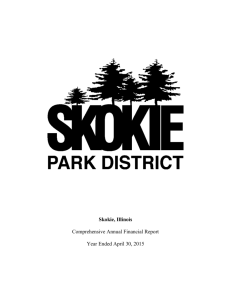Skokie Video Guide - Get Well Kathleen Davey
advertisement
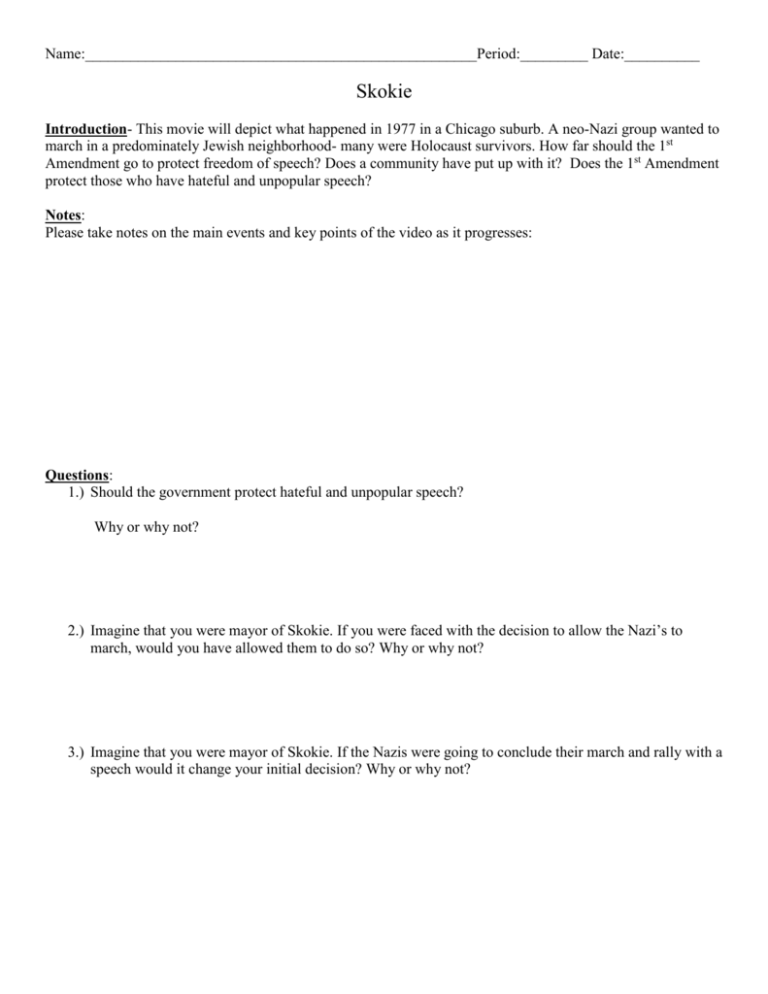
Name:____________________________________________________Period:_________ Date:__________ Skokie Introduction- This movie will depict what happened in 1977 in a Chicago suburb. A neo-Nazi group wanted to march in a predominately Jewish neighborhood- many were Holocaust survivors. How far should the 1st Amendment go to protect freedom of speech? Does a community have put up with it? Does the 1st Amendment protect those who have hateful and unpopular speech? Notes: Please take notes on the main events and key points of the video as it progresses: Questions: 1.) Should the government protect hateful and unpopular speech? Why or why not? 2.) Imagine that you were mayor of Skokie. If you were faced with the decision to allow the Nazi’s to march, would you have allowed them to do so? Why or why not? 3.) Imagine that you were mayor of Skokie. If the Nazis were going to conclude their march and rally with a speech would it change your initial decision? Why or why not? Skokie Interactively read this segment before answering the questions on the last page. A Liberal Speaks on First Amendment Rights The Skokie case presents an unusually dramatic example of the pros and cons of free speech and assembly issues. In this excerpt on the Skokie dilemma, from an article in the liberal journal Nation, the writer defends free assembly for all. As often happens when fundamental liberties are at stake, the principal involved in the Skokie, Illinois, right-tomarch case must be isolated form the motives of the American Nazi Party, whose civil rights are here in question. The provocative facts of he “Nazis” attempt to march in Hitlerism getups through a town with a large Jewish population, many of them survivors of German totalitarianism and its death camps, are extraordinarily repellent. This handful of lunatic demonstrators (who do not pretend to have any politics, not even that of the National Socialists they claim to ape), deliberately chose to try to route their march through a town where it would cause the maximum of pain-and therefore of publicity, which is all they are really after. Quite naturally, the authorities of this town of 70,000 on the outskirts of Chicago took strong measures to try ad prevent the ugly even from taking place. They got court order to bar the parade. Then they passed three ordinances aimed at preventing this kind of thing-by requiring large insurance bond to pay for damages that might occur from incited violence, by banning parades in paramilitary uniforms and by forbidding the display of symbols, slogans or literature the libeled a group…. We believe that the ACLU (American Civil Liberties Union) did the right thing when it challenged in court Skokie’s restrictive ordinances. Provocative demonstrations that arouse the anger of the majority are of course, not new in this country. The Selma, Alabama march led by Martin Luther King, Jr. is one famous example from the recent past. That confrontation of a minority insisting on its rights with a majority whose institutions resisted their exercise was a turning point in the long struggle for full freedom for black Americans. The Selma march would never have taken place if the authorities had been allowed to ban it on the ground that it would provoke the rage of white opponents of civil rights for black citizens and therefore endanger the peace. In Illinois, among other places, the ACLU has a long record of defending the rights of unpopular marchers. In 1966 it was Martin Luther King Jr. in Cicero. In 1968 it was the anti- war demonstrators at the Democratic Convention in Chicago (where Mayor Daley’s police deliberately failed o keep the peace). Two landmark First Amendment cases ( Terminiello and Gregory), reinforcing protesters’ rights and therefore those of the rest of us, were handled by the Illinois branch of the ACLU. At this moment it is representing in court the Martin Luther King Coalition’s right to march in Chicago’s Marquette Park area. The record is impeccable because it stands on the principle that constitutional rights must be defended for all who would exercise them, not just those whom we would selectively tolerate. Revolting as the “Nazi” contingent is, and painful as their proposed march will be to citizens who should not be afflicted by it, there is no way it can be prevented without doing serious damage to the liberties of all Americans, including the people of Skokie. Was there a cogent [convincing] case against even the pragmatic toleration of the demonstration? The most succinct argument in support of such a thesis was made by columnist Gary Wills. He insisted that the relevant body of law “is not the First Amendment but the nuisance statutes. The Nazis are not engaged in the rational airing of views, but in the provoking of irrational (but predictable) responses. They are, in effect, broadcasting an obscene phone call to a whole neighborhood instead of a single house.” The reasoning is persuasive. Though I am afraid to make a telephone call to establish that it is so, I assume that even the ACLU backs laws against individuals dialing a telephone number for the purpose of uttering random obscenities. This is among other things a violation of privacy. The march through Harlem by the KKK [Ku Klux Klan], or through Skokie by the Nazis, isn’t the exercise of the right of assembly, but an obscene phone call acting as an imposter under the umbrella of the First Amendment.
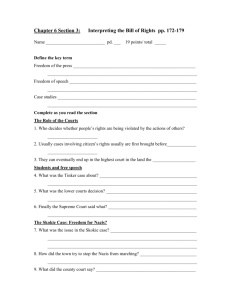
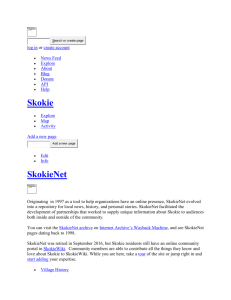
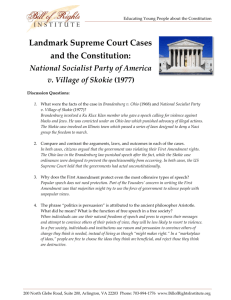
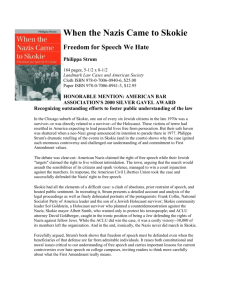
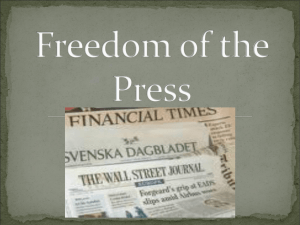
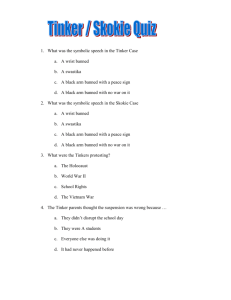
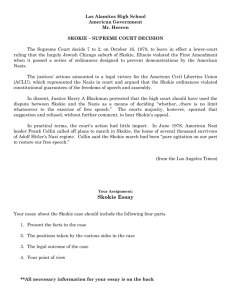
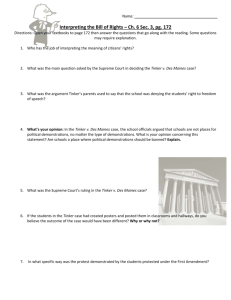
![2-DeJonge v. Orange [1937]](http://s2.studylib.net/store/data/009857970_1-fb6ae069129531acacdf1e4350eb8663-300x300.png)
